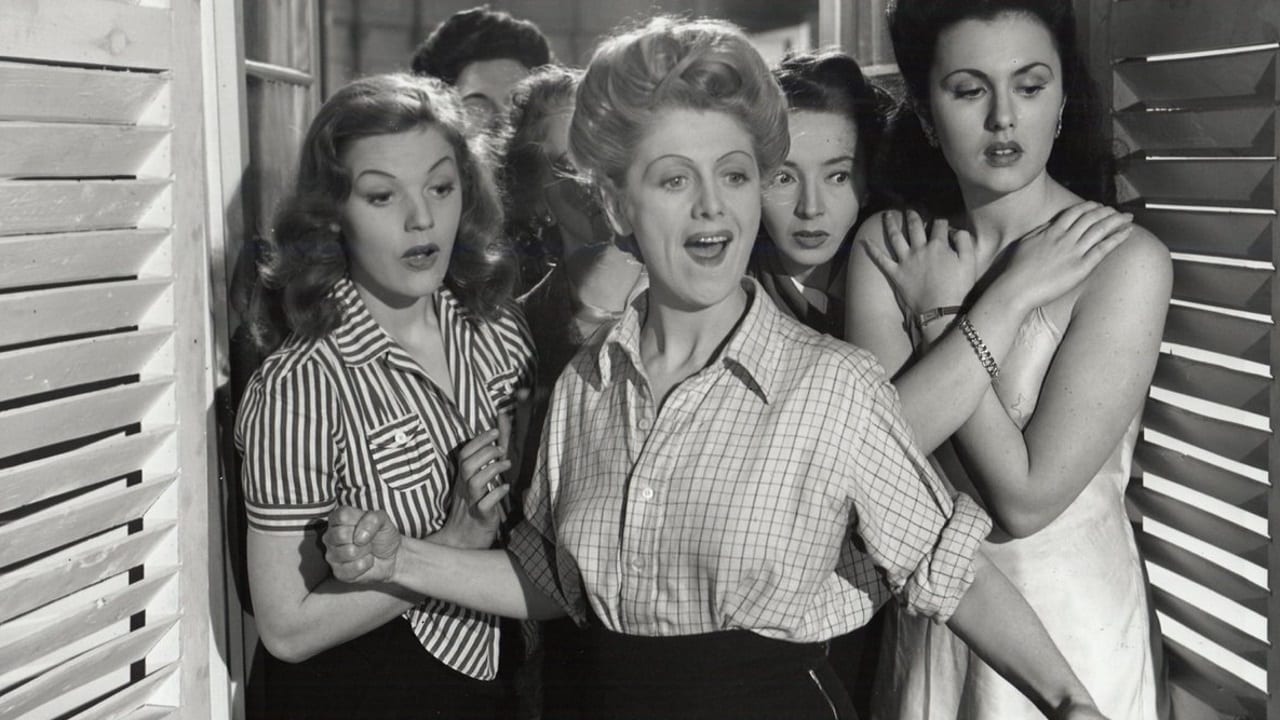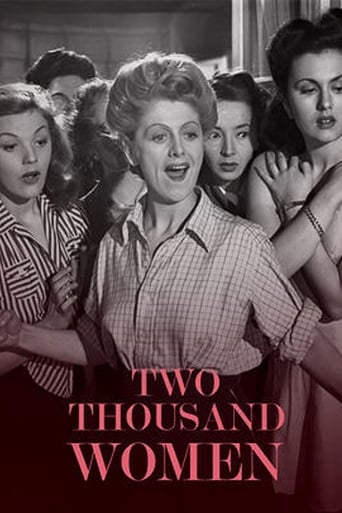

Even when under Nazi guard in a detention center, these women gather together to fight, scheme, laugh, love and entertain-all for the purpose of getting three British soldiers who crash-landed near their temporary home to safety. This enjoyable drama of a different type of resistance features a diverse variety of characters-flirtatious, bitchy, noble, older and wiser, dizzy, and even betrayers like the oh-so-plucky butch floor leader who is actually a Nazi informer. Lead by legendary British actresses Phyllis Calvert and Flora Robson, this patriotic flag-waver is a salute to the women left alone while their men fought or were already victims of the Nazi evil. Robson as a no-nonsense spinster unafraid to stand up to the Nazis gives a memorable performance especially when facing the threat of being shipped to Germany for alerting the British Air Force to the compound during an air raid. There are many moments of great satisfaction that these women have in either fooling or harassing the Nazis, particularly one when they have a house meeting with one of the men in attendance in drag.
... View MoreI recently stumbled upon this film on Channel 4. Thankfully I only missed the first ten minutes as it turned out to be a most enjoyable film.If you're reading this review then you have most probably seen the movie so a synopsis is not needed.All I really have to say is that the mainly female cast is absolutely superb. I defy anyone to pick out a single performance that stands out from the rest. Phyllis Calvert, Patricia Roc, Thora Hird..the excellent cast just oozes British actresses who went on to even greater performances.The only thing that let's this film down are the actors who play the British soldiers. Whilst they are good, I found them maybe a little too old for the parts.All in all though, it is a splendid film. If a remake were made today, it could boast an amazing cast of todays British talent.I checked IMDb after watching this film and sadly, most of the cast are with us no more. It is as a tribute to them that I write this little review.
... View MoreThe setting is a women's internment camp which resembles a very large, posh country house with several halls, plenty of space and some luxury rooms. Three RAF pilots find their way into the camp and the women must hide them before these 3 heroic chaps can make their escape. Will things work out as planned....? There are definitely not 2,000 women in this place. There are, however, a group of irritating women who deserve to be incarcerated. Phyllis Calvert as "Freda" speaks in a ghastly posh accent for the whole film and is quite annoying. Jean Kent as "Bridie" is the funniest to watch while Renee Houston as "Maude" is far better as a cabaret singer/performer than as a wise-cracking street-girl. Betty Jardine does well as section supervisor "Teresa" but there are no great performances in this story. Patricia Roc as "Rosemary" comes off as the best character but she shouldn't be in the film in the first place. She is caught by the French signalling to German airplanes to blow up an ammunition hold. She's in the wrong goddam prison! An attempt is made at sentimentalism by having somebody sing "There's no place like home" whilst we pan across several of the women's faces. It's rubbish. Another moment that doesn't work happens when Muriel (Flora Robson) and Clairen (Muriel Aked) are taken away to a German prison camp. I'm afraid that we just don't care! There is no drama. The men have absolutely no presence and come across as slightly wimpish.The ending is laughably bad. I'm not referring to the plot but to the rendition of "There'll always be an England". However, the film is lightweight fluff that passes the time and it's OK as that.
... View MoreAnyone waiting in vain for a number 63 bus in November, 1944, who happened to see this film soon afterwards would have realised that the missing omnibus was being driven through this plot that makes gossamer look like industrial strength tungsten. It's almost impossible to imagine that anyone who saw it in late 1944 or early 1945 and had endured five years of austerity would not have been insulted by this portrait of women actually living in interement but enjoying better lifestyles than those enjoying freedom at home. There's a token scene at the beginning where established internees haul buckets of water upstairs to fill a bath for a batch of newcomers but otherwise the women are expertly dressed and coiffed and as icing on the cake Phyliss Calvert turns up to a concert - within the château and one that has not been rehearsed and/or even mentioned until it is in full swing - in an evening dress magicked from God knows where. On the credit side it is a chance to see a turnout of half the distaff side of the British film industry at the time via the likes of Flora Robson, Thora Hird (even carrying her own daughter, Janette Scott, then a babe in arms) Ann Crawford, Jean Kent, Renee Asherson and an uncredited Dulcie Gray. Nice cast, shame about the joke of a plot.
... View More